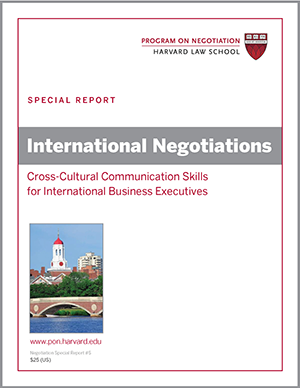
When two groups are embroiled in a conflict, it is common for the party with less power to have difficulty convincing the more powerful party to sit down at the negotiating table in negotiations. In such cases, the more powerful player is likely to resist the notion of shaking up the status quo—and thus avoid negotiating altogether. They have an agenda.
This tendency can be a particular problem in international negotiation, particularly those involving a protracted conflict.
Power in Negotiations
In a past negotiation research study, Nour Kteily of Northwestern University and his colleagues found that low-power groups can influence powerful parties to engage with them through their framing of the proposed negotiating agenda. Specifically, across four experiments, participants in the high-power position were more willing to negotiate when a low-power group proposed negotiating less important issues before more significant areas of disagreement, rather than vice versa. This preference is the opposite of what low-power parties prefer, the researchers learned.
Negotiation Example: Israel and Palestine – When to Discuss What Issues
In one of the experiments, Palestinian participants living in the West Bank and Jewish-Israeli participants both judged Israelis to be the more powerful party in their relationship. When presented with a hypothetical negotiating agenda from a delegation of the other group, Palestinians were more willing to negotiate when the Israeli side suggested discussing the most significant and difficult issues first. Israelis, by contrast, were more open to negotiation when the agenda proposed began with less contentious issues.
In the experiments, low-power disputants understood an agenda that opened with easier issues as an attempt by a more powerful would-be counterpart to stall change. By contrast, high-power disputants were threatened by proposed agendas that suggested less powerful parties would try to alter the status quo right from the start.
Thus, to bring powerful negotiating groups to the bargaining table, you might propose an agenda that starts with minor issues. When negotiations begin, however, you would be wise to incorporate discussion of more consequential problems, to the extent possible, as a means of finding tradeoffs among the full range of topics.
Negotiation Research article about Negotiating Power: “Negotiating Power: Agenda Ordering and the Willingness to Negotiate in Asymmetric Intergroup Conflicts,” by Nour Kteily, Tamar Saguy, James Sidanius, and Donald M. Taylor. Journal of Personality and Social Psychology, 2013.
How do you control the flow of negotiations? Let us know in the comments.
Adapted from “Bringing Powerful Parties to the Table,” first published in the November 2013 issue of the Negotiation newsletter.





When there is a conflict between two parties will it be a interesting if the ‘strong’ one starts negotiating with the otherone or a mediation is the most appropriate process for a good outcome?
Excellent topic. We need more suppirtive rules to carry out some difficult negotiations facing strong partner. Thanks a million
I have a few issues with the way all these negotiation studies generally are undertaken: q.v. “… low-power groups can influence powerful parties …” – how does one know what is low vs. high power? After all, the most you could do is put certain factors on ORDINAL scales, i.e. you cannot apply arithmetic operations like “add up and divide” to them. Therefore there is NO way of telling the exact “magnitude” of powers in such negotiations. The question then is: do we apply guesswork? How is our guessing influenced by our preconceptions? Etc. etc. The same applies e.g. so grading at school: there is no objective measure to e.g. evaluate an essay in English or French. Even in mathematics, if you allot 5 points to task A and another 5 points to task B, then the same to task C and student I solves A and B but student II solves B and C – both would get ten points. But how on earth do you know that tasks A, B and C should have the same “weight”, i.e. have the same OBJECTIVELY MEASURED difficulty? There is NO way to “measure” this. Equally I very much doubt you could really tell the negotiation powers apart by anything else but non-objectifiable “guesswork?!
Well-written piece. This approach makes psychological sense because as the article stated “high-power disputants were threatened by proposed agendas that suggested less powerful parties would try to alter the status quo right from the start.” You side-step this very real psychological concern by starting with less contentious issues. Find ways to overcome fear and resistance first and create a more receptive environment for your stronger interests.
Enjoyed the Israeli-Palestinian example.
excellent and informative. Reference to more sources can be helpful.
Most agendas are heavily biased towards ‘Content’ issues needing to be resolved. The more effective agendas are ‘Process Agendas’ which are agreed with the other party well in advance and allow formal negotiations over contentious issues to proceed more constructively.’Process’ agendas are tactical and benefit both parties.